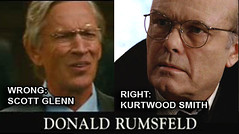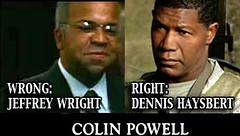It showed him as a dimwit, but not as a cruel, sociopathic liar and con artist.
One scene near the end was really disturbing because I remember the real life version. A reporter asks Bush if there's anything he would do differently as president after he's been in office a few years and his approval is slipping. Bush can't come up with anything.
In the film, Bush seems chastened and struggles for words as if overcome with regret, confusion, and guilt.
In real life when Bush was asked that, he looked like he couldn't even entertain the thought that he had made a mistake. If he was upset at all, it was at the questioner for being less than fawning and deferential. Stone got the words right, but the demeanor wrong.
That is an inexplicably inaccurate to the point of being dishonest choice on Oliver Stone's part.
Another very odd choice he made was having Cheney give a speech about the real purpose of the Iraq War: controlling Iraq's oil, being in a position to attack Iran, and therefore controlling the bulk of the world's oil supply and thereby the world--and everybody else in the meeting reacts by going back to talking about terrorist and protecting America as if they gave a shit.
There was a satiric and historically accurate opportunity missed by not exploring Karl Rove's role in Bush's rise more, like the sliming of John McCain in the 2000 election and how Bush reacted when McCain confronted him about it on Larry King. Stone even had a scene of Bush being out-slimed and out-Good-Ol'Boyed in a debate during his first failed congressional run that would have been an excellent bookend to his later effective ruthlessness. Rove looks at most like a wormy aide, not a Machiavellian king-maker and uber-dirty trickster.
A couple of the casting choices were just odd.
Having Scott Glenn play Rumsfeld was an undeserved compliment. Glenn has made his career playing laconic cowboys and their equivalents, men who would never say ''Goodness gracious'' even they were threatened with a hot branding iron. Kurtwood Smith of That 70's Show could do Rummy's combination of smarmy prissiness and impatience with the opinions and concerns of others in his sleep.

Jeffrey Wright, a great actor in any number of other parts, chose to do Colin Powell in a gravelly monotone voice. He did good work here, but Dennis Haysbert who played the president on 24, looks and acts like Colin Powell's twin brother (just a shade darker). I always think of Wright as a young guy too, whereas Powell and Haysbert both act like they aren't now and never were young.

Thandie Newton is also a great actress, but her performance here was at the level of a Saturday Night Live skit. Her Condi was little more than awkward posture and vocal tics.
Oscar winner Ellen Burstyn barely turned in a note and a half performance as Barbara Bush, as loud but ultimately concerned about her wayward son. A great, bitter real life moment was missed when they didn't have her callous comment about Hurricane Katrina victims being better off in a stadium than they were before the storm.
That is probably the heart of what is wrong with the movie. There were so many moments like that in Bush's presidency that were missed:
- the already mentioned smearing of McCain in 2000
- his appearance on televangelists' TV shows as seen in The World According to Bush
- the phone call when Gore retracted his concession
- contrasting his redneck public image with telling a black tie and tails crowd that they were his base, "the haves and have mores"
- Flying all the way to California just to refuse the Democratic governor's plea to make federal regulators do their jobs when the state was being blackmailed out of billions by energy traders who jacked up the price of electricity, and created artificial scarcity that led to rolling blackouts.
- getting the ''Bin Laden Determined to Strike in US'' memo and telling the briefer he'd covered his ass and could go
- standing on the rubble of the World Trade Center yelling through a megaphone
- saying he would get bin Laden ''dead or alive''
- then later saying he didn't care where he was
- Desperately classifying and trying to diffuse the Joint Congressional Inquiry into 9/11's finding that his friends the Saudi government had a major role in the 9/11 attacks, and appearing with a Saudi prince to reassure him of our friendship (contrasted with the belligerence toward Iraq and later Iran, both of whom had nothing to do with 9/11).
- the WMD skit juxtaposed with his serious speeches before the war about ''the threat'' from Iraq
- calling critics unpatriotic and retaliating against them from Dan Rather to Joe Wilson
- ignoring laws passed by congress or adding signing statements that contradict the plain sense of the law, setting up a constitutional showdown where Congress blinked and he didn't
- the scripted press conferences staged to the point of having a male prostitute pose as a reporter and lob softball questions
- the use of terror alerts and bin Laden tapes at politically convenient times
- being unconcerned about Hurricane Katrina apart from how his cronies could capitalize on the disaster, and his aides being so afraid of him that they didn't tell him he wasn't doing enough until days later.
- and on and on...
Any film biography has to make a choice: either it can zero in on a film-sized chunk of the subjects life, a period or two that symbolize the whole, or it can do the cliff notes version of their whole life. The latter is rarely successful, and Stone fell into that trap.
There is a great story to be told about Baby Bush and the family that spawned him, something combining Shakespeare's scheming hunchback, Richard III with the wastrel Prince Hal from Henry IV Part I. Instead of making that movie, he made Forrest Gump Goes to the White House.
 |  |  |  |  |
No comments:
Post a Comment